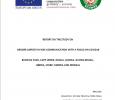Background
The epidemiological profile of the region is marked by persist communicable diseases including neglected tropical diseases, increasing prevalence of non-communicable diseases and problems of nutrition. Among the communicable diseases, malaria represents the primary cause of morbidity and mortality. Tuberculosis continues to be of concern especially with the emergence of multi-resistance and co-infection tuberculosis/AIDS, which is the leading cause of death among persons living with HIV. Neglected Tropical Diseases, like trachoma, lymphatic filariosis, schistosomiasis, soil-transmitted helminthiasis, African human trypanosomiasis, and onchocerciasis are still common in the ECOWAS region. With regards to non-communicable diseases (NCD), the most common in West Africa are high blood pressure, diabetes, cerebrovascular accidents (CVA) and ischaemic heart disease. Furthermore mental and ocular disorders, road accidents and malnutrition continue to be major public health problems within the ECOWAS region.
Problem Statement
Mortality and morbidity linked to communicable and non-communicable diseases are very high in Member States with serious socio-economic consequences.
Programme Objective
Reduce the prevalence of communicable and non-communicable diseases.
Programme Outcomes
The prevalence of communicable and non-communicable diseases reduced.
Programme Components
- Control of communicable diseases
- Control of neglected tropical diseases
- Control of non communicable diseases
- Control of nutritional imbalances
Specific Objectives
- Attain the epidemiological threshold for the pre-elimination of malaria
- Reinforce the DOTS (directly observed therapy) strategy in tuberculosis control
- Improve the prevention, screening and access to HIV/AIDS treatment
- Reduce morbidity and complications due to neglected tropical diseases
- Reduce the principal common factors of risk modifiable in non communicable diseases
- Reduce malnutrition prevalence
- Build the capacities of national disease control Programmes.
Major Interventions
- Strengthening of multi-sector coordination of malaria, Tuberculosis and HIV/AIDS control in country and in the region;
- Strengthening of interventions of prevention, care and treatment of malaria, Tuberculosis and HIV, particularly among key populations;
- Development of a regional plan on non-communicable diseases
- Development of a regional plan on Neglected Tropical Diseases;
- Development of a regional plan on nutrition.
Intermediate Outcomes
- The incidence of malaria in the region reduced
- Cure rates of tuberculosis patients increased
- Prevalence of HIV infection reduced
- Prevalence of avoidable blindness reduced
- Strategy documents on mental health updated
- Access to treatment by populations at risk of HIV infection increased
- Access to care for populations at risk of NTDs increased
- Regional plan on NCDs available ;
- Regional plan on NTDs available
- Regional plan on nutrition available.


